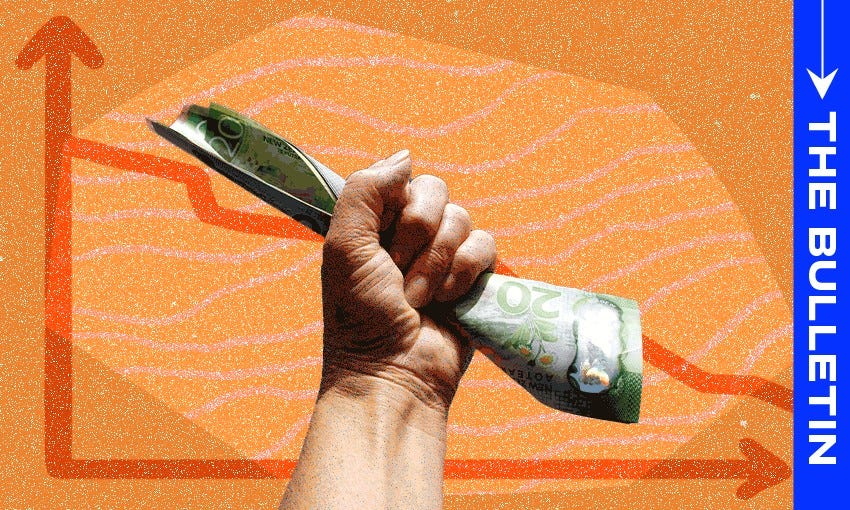Recession or not, the short term economic outlook is murky
The state of the economy will be laid bare later this morning, and it might not be good news.
Mōrena, and welcome to The Bulletin for Thursday, September 19.
In today’s edition: Health commissioner faces scrutiny in select committee, Philip Polkinghorne jury to begin deliberations, and the Commerce Commission will file charges against Jetstar alleging it misled customers. But first, economists predict a murky outlook for the economy.
Opening the books
The state of the economy will be laid bare later this morning with the release of the most recent GDP figures for the three months to June. After a slight pick up in the last quarter pulled us out of recession, today’s numbers are predicted to be less rosy, explained The Post’s Tom Pullar-Strecker. The Reserve Bank picked the economy would shrink by 0.5% after last quarter’s 0.2% growth, while the main banks are also generally predicting a drop of anywhere from 0.1% to 0.4%. Any shrinkage would suggest we’re back in recession, though we would need to wait for the next round of data to be sure of this given two consecutive declines are the indicator for recession.
Nevertheless, recession or not, things remain fairly static and it could be a while before that general “mood” changes. New Zealand’s current account deficit increased unexpectedly to $7.2 billion in the three months to the end of June, figures released yesterday revealed. And economists are painting a fairly grim picture of the months ahead and the “rolling maul” recession, reported the Herald’s Liam Dann (paywalled).
Get ready for ‘Super Thursday’
We’ll also get a better picture of how rest of the world is faring today, which is partly why Kiwibank has dubbed it “Super Thursday”. First up, the US Federal Reserve, the world’s most influential central bank, has just delivered its first cut in four years. The last time was in the early days of the Covid pandemic, explained CNBC. The Fed has opted for a “jumbo cut” of 50 basis points, which was widely picked, signalling that inflation is heading in the right direction.
The Fed decision will be widely watched by economists here and around the world. Speaking to Newstalk ZB’s Ryan Bridge earlier this morning, BNZ’s chief economist Mike Jones said the move could be “very influential” for interest rates globally and could put a “little more pressure” on our own Reserve Bank to continue down the same path. There are two cash rate reviews left for this year, on October 9 and November 27.
Meanwhile, “Super Thursday” will wrap with new Australian jobs data and be followed shortly after by policy decisions from both the Bank of England and Bank of Japan.
A third mill closes
Back at home, the unsettled economic environment can be held partly responsible for the closure of yet another mill. The Oji Fibre Solutions mill in the Auckland suburb of Penrose will close permanently, reported RNZ, with as many as 75 jobs to go. It comes soon after hundreds of workers were let go at the two Winstone Pulp mills in Ruapehu with 230 people out of a job. "We see no prospect of the situation improving, and we cannot continue the way we are now,” staff at Oji Fibre Solutions were told.
High energy prices and rising labour costs are partly to blame, but prime minister Christopher Luxon told reporters that "economic mismanagement” by the former government was the cause. “Unemployment is on the rise as firms are having to lay workers off after having dealt with the recession, high interest rates and high inflation,” he said.
Survive to ‘25?
Despite interest rates being cut and the cost of living crisis easing, things still feel murky. In some ways, whether or not the figures today do indeed point to a triple-dip recession doesn’t actually matter – it’s tough out there. “Officially we may record three dips. But for households and businesses, it has been two years of unrelenting recession,” argued Kiwibank’s economists. But GDP dip or not, the longer term outlook remains more positive. Asked by Corin Dann on RNZ’s Morning Report whether the so-called mantra of “survive to 2025” should really be “survive through 2025”, Kiwibank chief economist Jarod Kerr signalled things were going to get better – but it wouldn’t be overnight.
Writing for Interest, David Hargreaves said the big thing to watch out for today will be whether we’ve reached the bottom of the cycle. “Maybe we can draw some positives and encouragement that the future is now looking 'less bad',” he wrote. “But less bad doesn't immediately become good.” After today, all eyes will be fixed on the next official cash rate decision and whether businesses take encouragement from lower interest rates, especially given confidence soared in the wake of the last cut.
Join The Spinoff Members
"Happy to be alive, proud to be a member. Keep up the good work." - Neera, Spinoff member.
If you value our work and want to support us, please consider becoming a member today. Already a member? Thank you!
Health NZ’s financial issues aren’t ‘the main show’ – Levy
On the same day it was revealed he’s holding down two jobs, the new health commissioner Lester Levy faced scrutiny from MPs across the political spectrum. Appearing before the health select committee, Lester said there was a “cocktail of issues” at Te Whatu Ora and the financial situation remained precarious, reported RNZ’s Jo Moir. But despite the possibility of a $1.4bn deficit at the agency, Lester said the financial situation wasn’t the most pressing. "The main show in town is actually getting these waiting times down, ensuring the services are safe and of high quality and creating an environment within the organisation that is a rewarding environment for staff to work and we've got challenges across all these domains," he said.
Meanwhile, Labour’s health spokesperson Ayesha Verrall pressed Levy on reports of non-disclosure agreements being used to potentially “gag” workers, explained NZ Doctor’s Stephen Forbes (paywalled). Verrall called the practice “North Korean” and urged the agency to stop it. Levy said it wasn’t something he endorsed, nor something he was aware of when he took on the commissioner role.
Government warned of need for more workers in transport sector
On the front page of the Herald today, Thomas Coughlan reports (paywalled) on the number of new construction and engineering workers that would need to be hired by 2026 to deliver on the government’s infrastructure promises. Officials warned the government (and the last administration) that the workforce would need to be bolstered by the equivalent of the population of Ashburton, writes Coughlan, or about 25,000 people. That would take the total number of workers to 65,000. The figures were in a briefing to the transport minister Simeon Brown about challenges arising from proposed transport plans by the last government. I, too, will now be measuring figures in comparison to the population of regional New Zealand towns.
But as Coughlan notes, the coalition has put forward an even larger transport plan since taking office than its predecessor. Brown remains confident and said the figure came from early advice. “The government is taking a number of actions to get a 30-year plan in place... so that we can get more certainty and confidence to the sector so they have confidence to employ and hire people to deliver the long-term pipeline for New Zealand,” the minister said.
Looking for the perfect gift?
Celebrate spring by gifting a bottle from By The Bottle. Whether it’s for a special occasion or just to show you care, their range of organic, biodynamic and small-batch wines, spirits, beers and non-alcoholic beverages makes gifting easy. Shop online or visit their Mount Eden store to find New Zealand’s finest sustainably produced beverages.
With nationwide shipping and click & collect options, giving the gift of something special has never been simpler. (sponsored)
Click and Collect
After eight weeks, the jury in the Philip Polkinghorne murder trial will start deliberations. The Herald’s Ric Stevens has an interesting piece explaining how the jury process works and when a verdict might be reached.
Have you noticed higher than expected duty free prices while travelling through Auckland Airport?
Pollster David Farrar is standing by his research company’s work and says it will remain subject to scrutiny.
There’s a brand new episode of The Spinoff’s politics podcast Gone by Lunchtime for your morning commute, with the team talking the latest on the Treaty Principles Bill.
Commerce Commission to file charges against Jetstar alleging it misled customers.
For NBR subscribers, Brent Edwards has a good look at why the government could opt to privatise more of our state-owned enterprises. (paywalled)
Artificial intelligence a “top governance priority” for TVNZ, reports BusinessDesk. (paywalled)
Hamilton Gardens sees its first paying customers after introducing $20 fee.
We’ve got our first look at the Australian reboot of The Office, featuring a lot of familiar faces. Initial reactions have been… mixed. But let me know what you think in the comments.
The snow is melting. Shanti Mathias asks skiiers and mountaineers what they're doing about climate change. Duncan Greive discusses what the return of free-to-air sports could mean for NZ Rugby. Claire Mabey explains the changes to author payment scheme the Public Lending Right. For The Spinoff Books Confessional, Abby Irwin-Jones describes herself as a proud reader of terrible books. Hayden Donnell celebrates the parliamentary petitions page, the lynchpin of New Zealand's democracy. Liam Rātana argues that when it comes to using Māori names in branding, it's time to call out Māori brands too. And school principal Martyn Weatherill explains why he's worried about the new curriculum.
Pop culture picks
It’s Thursday, which means it’s time to hear from our resident entertainment expert. Here’s what Alex Casey has been reading.
Filming has begun on a new rat king reality season of Survivor Australia vs The World, including franchise heavyweights Parvati Shallow and Tony Vlachos, as well as murmurings of a few New Zealanders. Justice for JT Muirhead? Applause for Adam O'Brien? We hope, we pray.
Locally-made Time Bandits has sadly been cancelled after one season by AppleTV+. Guess we will never find out if Jemaine Clement would make good on his promise to feature Carterton's extremely janky Stonehenge replica in season two.
Shrek will be returning to the big screen in te reo Māori next year. "The biggest challenge is to find the 'sweet spot' when it comes to matching the humour – which is funny when expressed in English – and then find its equivalent in Māori," head translator Te Kiwa Goddard told RNZ. Can't wait.
That’s it for this morning, thanks for reading. I’ll catch you back tomorrow.
Want to get in touch? Join the conversation in the Substack comments section or via email at thebulletin@thespinoff.co.nz if you have any feedback on today’s top stories (or anything else in the news).
If you liked what you read today, share The Bulletin with friends, family and colleagues.

















Re: pulp mill closures. Luxon says; "..."economic mismanagement” by the former government was the cause. " I call bullshit on this- it's a sunk cost fallacy. Business managers make decisions on the basis of future expectations- not past regrets.
It's Women Suffrage Day but instead of celebrating it The Bulletin features more Newstalk ZB and Luxon's unchallenged economic reckons.